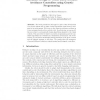476 search results - page 59 / 96 » Randomized Robot Navigation Algorithms |
88
Voted
ICRA
2010
IEEE
15 years 21 days ago
2010
IEEE
Abstract— We present a novel vision-based grasp point detection algorithm that can reliably detect the corners of a piece of cloth, using only geometric cues that are robust to v...
157
Voted
AE
2007
Springer
15 years 8 months ago
2007
Springer
The work presented in this paper is part of the development of a robotic system able to learn context dependent visual clues to navigate in its environment. We focus on the obstacl...
124
click to vote
ICRA
2005
IEEE
15 years 7 months ago
2005
IEEE
— We present the design and implementation of a real-time vision-based approach to detect and track features in a structured environment using an autonomous helicopter. Using vis...
142
Voted
RSS
2007
15 years 3 months ago
2007
Abstract— This paper proposes a simulation-based active policy learning algorithm for finite-horizon, partially-observed sequential decision processes. The algorithm is tested i...
104
Voted
CONNECTION
2006
15 years 2 months ago
2006
By learning a range of possible times over which the effect of an action can take place, a robot can reason more effectively about causal and contingent relationships in the world...

